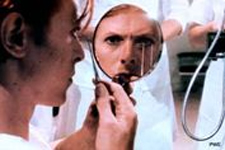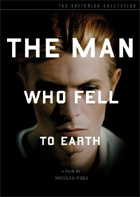The Man Who Fell to Earth [DVD]
|
 Nicolas Roeg, one of the great "mad poets" to emerge from British cinema, began his career as a cinematographer, and it shows in his films, which are unusually alive and charged with friction, danger, eroticism, and lyrical moments of such beauty that they seem almost fluid. He has a gift for making the mundane seem extraordinary, or at least weird, which is why he was so uniquely equipped to tackle The Man Who Fell to Earth, a science fiction parable with virtually no science or special effects or spacescapes or any of the other imagery we have come to associate with the genre.
Nicolas Roeg, one of the great "mad poets" to emerge from British cinema, began his career as a cinematographer, and it shows in his films, which are unusually alive and charged with friction, danger, eroticism, and lyrical moments of such beauty that they seem almost fluid. He has a gift for making the mundane seem extraordinary, or at least weird, which is why he was so uniquely equipped to tackle The Man Who Fell to Earth, a science fiction parable with virtually no science or special effects or spacescapes or any of the other imagery we have come to associate with the genre.
The Man Who Fell to Earth is simultaneously one of Roeg's best films and one of his worst, which is not an impossible contradiction in his realm. It is plugged directly into Roeg's visual gifts and mystical sensibilities, which he had already displayed to great effect in the beautiful, tragic children's story Walkabout (1971) and the psychic horror thriller Don't Look Now (1973). But, The Man Who Fell to Earth also gets muddled in Roeg's tendency to elevate imagery over narrative and character, to the point that it becomes all but incomprehensible by the final reel. This is not necessarily a bad thing, except to those classical Hollywood purists who feel that story is the central essence of filmmaking; but, at the same time, it is arguably a hindrance to the film's overriding political themes, which get as blurred and washed out as the multiple storylines. Roeg made the brilliant casting choice of using pop icon David Bowie, who at the time had just come off his gender-bending Ziggy Stardust tour and was at the height of his '70s superstardom, to play the film's titular alien. Especially in his younger years, Bowie already had a slightly otherworldly quality, and his waxy, androgynous beauty gives the constant illusion that he is something else playing behind a mask. His lithe body and gentle face suggest a kind of innocence, as if he is not yet fully formed, which is central to the film's message about the nature of corruption. Bowie's alien has come to earth in search of water to save his dying planet, which we see if brief, dusty flashbacks. He takes the name Thomas Jerome Newton, each part of which is borrowed from a famous scientist/inventor (Thomas Edison, Jerome Lemelson, and Sir Isaac Newton), which is apt because he makes his fortune on earth by controlling nine basic patents that he brought with him, one of which is a form of self-developing film. These patents allow him to build an enormous tech corporation, the profits of which he plans to use to build a spaceship, ostensibly to return him to his home planet, although that is just supposition since it's never made entirely clear. While on earth, Newton interacts with several recurring characters, each of whom represents some form of human fallibility that is unfortunately passed on to Newton, who becomes so corrupted by their influence that his mission is in constant jeopardy. When he first arrives, he contacts a patent attorney named Oliver Farnsworth (Buck Henry), whose basic greediness represents the rotten core on which American industry is constructed. Newton also hires a scientist named Nathan Bryce (Rip Torn), whose days as a lecherous college professor were spent chasing his female students. Finally, Newton meets Mary-Lou (Candy Clark), a sweet, simply maid at a hotel who will eventually become his lover, but whose neediness and lack of identity interject constant cloudiness into Newton's life and sense of purpose. She is also alcoholic who introduces Newton to the pleasures of gin and vodka, and the physical dependence he develops to alcohol proves to be his true undoing. The underlying message that ties all these characters and their weaknesses together is the debilitating dangers of addiction--to money, to sex, to drugs, to power. There is no solace to be found in any of these things: The money is ultimately meaningless, sex is depicted as violent and depraved (at one point even involving a pistol), alcohol merely numbs and confuses, and the consolation of power only incites the wrath of those with even more power, in this case a shady government agency that eventually captures Newton and kills Farnsworth because their corporation had become too threatening. Even love doesn't seem to hold any sense of redemption, as it fails under challenge and eventually leads to betrayal. In some way or other, every human in the film betrays Newton, which is quite possibly the one thing he never could have anticipated. In the sense that Newton is portrayed as innocence corrupted, The Man Who Fell to Earth plays like a modern fairy tale. At one point, Mary-Lou asks Newton if he hates her, and he says no, that hate is an impossibility for him. Innocence, in this sense, is Edenic innocence--the inability to distinguish between good and evil. Newton remains an enigmatic character because he doesn't carry with him all the human traits that we latch onto, both positive and negative. He is something of a blank slate, and when he does reveal emotion, it is because it has been rubbed off on him by others. The only emotion he displays that feels in some way organic to his character is fear. Roeg and his screenwriter Paul Mayersberg, who adapted a 1963 novel by Walter Tevis (best known for writing The Hustler), are primarily interested in the idea of otherness and what happens when an alien body is subjected to the influences of modern civilization. The story covers several decades, and the narrative moves in fits and jumps, often leaping ahead many years with a single cut, which leaves the viewer frequently disoriented and grasping for connection, much like Newton himself. The film's jagged, sometimes confusing nonlinear structure and its tendency to make American iconography (from skyscrapers to Western landscapes) slightly otherworldly firmly plants us in Newton's shoes, showing us the familiar through alien(ated) eyes. Critics were not terribly kind to The Man Who Fell to Earth when it premiered in 1976, either in England or in the U.S. American critics were at a distinct disadvantage since the U.S. distributor inanely chopped 20 minutes out of the film, making it even more incoherent and robbing it of some of its crucial thematic meaning. But, even with those 20 minutes restored, the film's narrative confusion and heavy symbolism make for a difficult viewing experience, and many critics simply didn't want to try to wrap their minds around Roeg's enigmatic imagery. John Simon, never one to mince words, wrote disparagingly, "it is, like all Roeg's films, the blowing up of something simple or simple-minded to arrogantly bloated dimensions and purporting to be chock-full of hermetic truths merely awaiting their interpreters." In a sense, Simon is right, although I would argue that there is nothing simple or simple-minded about the themes in The Man Who Fell to Earth. In fact, like the best of science fiction, it uses one of the genre's most fundamental narratives (the alien visitor) to explore larger issues, in this case the nature of human corruption. Although not all the details fall squarely into place and the narrative bits and pieces don't entirely add up, Roeg is certainly successful in painting a sometimes beautiful, frequently painful, but always intriguing cinematic portrait of innocence corrupted. In writing about Jean-Luc Godard's Masculin féminin in 1965, the great critic Pauline Kael noted quite rightly "you don't need to understand every detail in order to experience the beauty of the work as it's going on." The exact same could be said for The Man Who Fell to Earth.
Copyright ©2005 James Kendrick Thoughts? E-mail James Kendrick All images copyright © The Criterion Collection | ||||||||||||||||||||||||||||||||||||||||||||||
Overall Rating:



 (3.5)
(3.5)
Subscribe and Follow
Get a daily dose of Africa Leader news through our daily email, its complimentary and keeps you fully up to date with world and business news as well.
News RELEASES
Publish news of your business, community or sports group, personnel appointments, major event and more by submitting a news release to Africa Leader.
More Information
